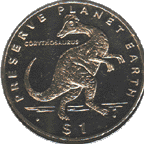The skeleton is that of a juvenile which was about 4 metres long;
full
adults would have reached twice this size. The crest on the head of this dinosaur
looks like a dinner plate set on top of the skull-and inside are a complex array
of tubes
that connect the nasal opening with the back of the throat.
Most paleontologists
think that crests and helmets on duck-billed dinosaurs had
something to do with
sound production-so that these duck-billed dinosaurs may have
honked and made
other noises to each other. The crests also probably had something to
do with
each species recognizing members of its own species-
just as antleope horns in
the African savannah are signals today.
The crest on the Corythosaurus is much
like the helmut or casque
on the head of the living Cassowary. This helmet is
used as a "hardhat" as
the bird crashes through underbrush. Possibly
the bony crest of Corythosaurus
served one or more of these functions.

This
is a $1 dollar coin issued by the government of Liberia.
It is larger than a silver
dollar.


